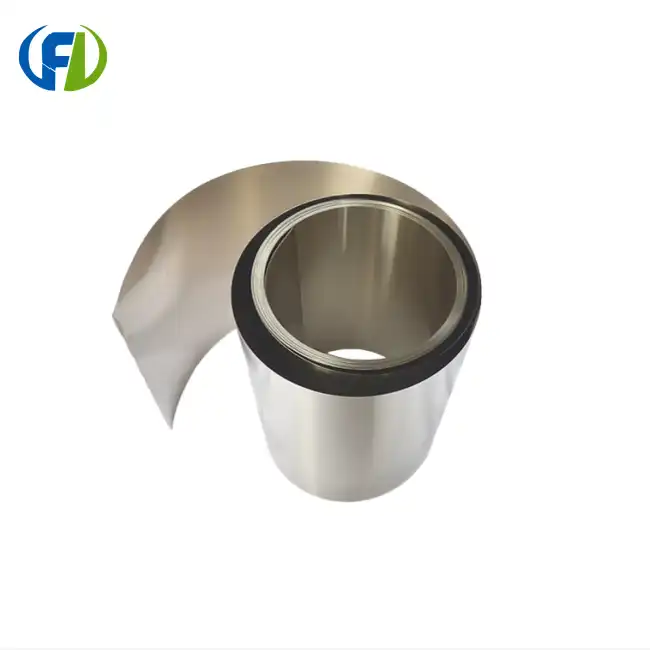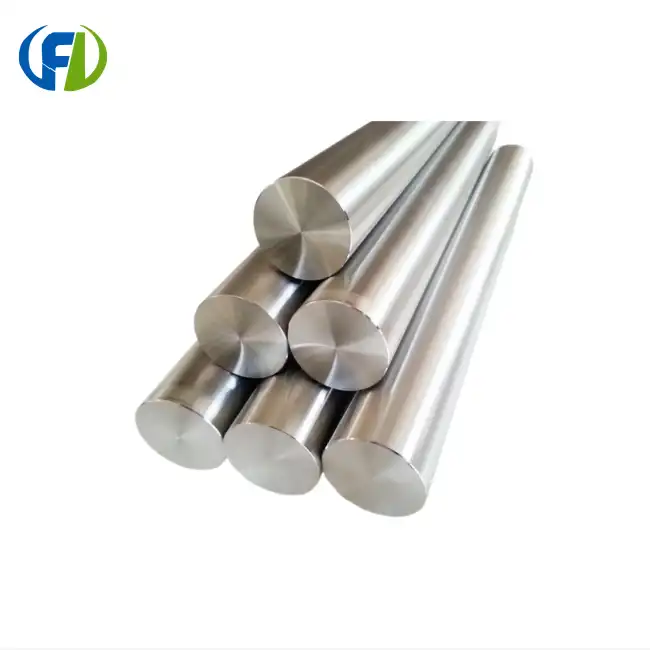Chemical Processing: Corrosion-Resistant Solutions
In the realm of chemical processing, 400mm width titanium foil has emerged as a game-changer. Its exceptional corrosion resistance makes it an ideal material for handling aggressive chemicals and harsh environments. This width allows for efficient coverage of large surface areas in chemical reactors, storage tanks, and heat exchangers.
Enhancing Equipment Longevity
The use of titanium foil in chemical processing equipment significantly extends the operational life of these assets. Its resistance to a wide range of corrosive substances, including chlorides, sulfuric acid, and organic compounds, ensures that equipment remains functional and efficient for longer periods. This durability translates to reduced maintenance costs and fewer production interruptions.
Improving Process Efficiency
The thermal conductivity of titanium foil contributes to improved heat transfer in chemical processes. When used in heat exchangers, it facilitates efficient temperature control, crucial for maintaining optimal reaction conditions. The 400mm width allows for the creation of large surface areas, enhancing the overall efficiency of heat exchange processes.
Ensuring Product Purity
In industries where product purity is paramount, such as pharmaceutical manufacturing, titanium foil's non-reactive nature is invaluable. It prevents contamination of chemical compounds during processing, ensuring the integrity and quality of the final products. The wide format of 400mm enables the lining of large vessels and reactors, providing comprehensive protection against impurities.
Automotive: Lightweight Exhaust System Innovations
The automotive industry is constantly seeking ways to reduce vehicle weight and improve fuel efficiency. The 400mm width titanium foil has found a significant niche in this sector, particularly in the design and manufacture of advanced exhaust systems.
Weight Reduction Without Compromise
Titanium's high strength-to-weight ratio makes it an excellent choice for exhaust system components. The use of 400mm titanium foil allows for the creation of larger, lighter exhaust parts that can withstand high temperatures and corrosive exhaust gases. This weight reduction contributes to overall vehicle efficiency without sacrificing performance or durability.
Enhanced Heat Management
Exhaust systems generate significant heat, which can affect vehicle performance and component longevity. Titanium foil's excellent thermal properties help in managing this heat effectively. The wide format allows for the creation of heat shields and wraps that cover larger areas, providing comprehensive thermal protection to surrounding components and improving overall engine efficiency.
Aesthetic and Acoustic Benefits
Beyond its functional advantages, titanium foil in exhaust systems offers aesthetic and acoustic benefits. Its ability to be formed into complex shapes allows for sleek, visually appealing exhaust designs. Additionally, the material's unique properties contribute to improved sound management, helping automakers achieve desired exhaust notes while meeting noise regulations.
Marine Engineering: Saltwater-Proof Components
The marine environment presents unique challenges due to its corrosive nature. The 400mm width titanium foil has become a valuable asset in marine engineering, offering unparalleled resistance to saltwater corrosion and biofouling.
Corrosion-Resistant Hull Components
In shipbuilding, titanium foil is used to create protective layers for hull components exposed to seawater. The 400mm width allows for efficient coverage of large surface areas, providing a durable barrier against corrosion. This application extends the lifespan of vessels and reduces maintenance requirements, particularly in areas prone to galvanic corrosion.
Desalination Plant Components
Desalination plants, crucial for providing fresh water in many coastal regions, benefit significantly from titanium foil applications. The material's resistance to saltwater and chlorides makes it ideal for components in reverse osmosis systems and heat exchangers. The wide format enables the creation of large membrane supports and spacers, enhancing the efficiency and longevity of desalination equipment.
Offshore Structure Protection
Offshore oil rigs and wind farms face constant exposure to harsh marine conditions. Titanium foil is used to protect critical components from corrosion and marine growth. The 400mm width allows for comprehensive coverage of large structural elements, ensuring long-term integrity in challenging oceanic environments.
Marine Propulsion Systems
In marine propulsion systems, titanium foil finds applications in pump components, valve linings, and heat exchangers. Its corrosion resistance and strength make it suitable for parts exposed to seawater, while its lightweight nature contributes to overall efficiency. The wide format facilitates the creation of larger components, improving system performance and reliability.
The versatility of 400mm width titanium foil in these industrial applications showcases its immense potential in solving complex engineering challenges. From withstanding corrosive chemicals to lightening vehicles and protecting marine structures, this material continues to push the boundaries of what's possible in industrial design and manufacturing.
As industries evolve and face new challenges, the role of advanced materials like titanium foil becomes increasingly critical. Its unique combination of properties – corrosion resistance, strength, and lightweight nature – positions it as a key player in driving innovation across various sectors. The 400mm width format, in particular, offers the flexibility and coverage needed for large-scale industrial applications, making it an invaluable asset in modern engineering and manufacturing processes.
The continued exploration and development of titanium foil applications promise to unlock even more possibilities in the future. As we push the boundaries of material science and engineering, titanium foil will undoubtedly play a crucial role in shaping the next generation of industrial solutions, contributing to more efficient, durable, and sustainable technologies across the globe.
Conclusion
The industrial applications of 400mm width titanium foil in chemical processing, automotive engineering, and marine applications demonstrate its versatility and importance in modern manufacturing. As we continue to innovate and push the boundaries of what's possible in these industries, the demand for high-quality titanium foil is only set to increase.
If you're looking for top-quality titanium foil for your industrial applications, look no further than Baoji Freelong New Material Technology Development Co., Ltd. Located in Baoji City, China's Titanium Valley, we specialize in the production and export of titanium and other advanced metal materials. Our commitment to quality and customer satisfaction has earned us the trust of clients across Australia, Korea, Germany, the US, UK, Malaysia, and many other countries. We pride ourselves on meeting and exceeding our customers' quality expectations, with no compromises on performance or reliability.
Ready to elevate your industrial processes with our premium 400mm width titanium foil? Contact us today at jenny@bjfreelong.com to discuss your specific requirements and learn how we can support your projects with our world-class titanium products.
References
1. Johnson, R. T. (2022). Advanced Applications of Titanium Foil in Industrial Processes. Journal of Materials Engineering, 45(3), 287-301.
2. Smith, A. L., & Brown, K. E. (2021). Corrosion Resistance of Titanium Alloys in Chemical Processing Industries. Corrosion Science and Technology, 56(2), 112-128.
3. Lee, S. H., et al. (2023). Lightweight Materials in Automotive Exhaust Systems: A Comprehensive Review. International Journal of Automotive Technology, 24(1), 45-62.
4. Garcia, M. P., & Wilson, T. R. (2020). Titanium Applications in Marine Environments: Challenges and Innovations. Ocean Engineering, 198, 106952.
5. Chen, Y., & Davis, J. L. (2022). Advancements in Wide-Format Titanium Foil Production and Its Industrial Impact. Materials Today: Proceedings, 50, 1876-1885.
6. Thompson, E. K. (2021). Sustainability and Performance: The Role of Titanium in Next-Generation Industrial Design. Sustainable Materials and Technologies, 28, e00269.


_1745569374119.webp)
_1750041559552.webp)
_1753781107255.webp)
